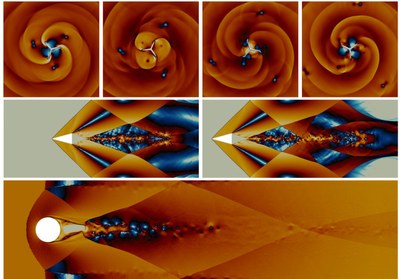Workshop “Multi-scale, Multi-physics and Coupled Problems on highly parallel systems (MMCP)” HPC Asia 2022
This workshop will provide a platform for presentations and discussions on advanced numerical simulation for complex multi-scale, multi-physics and coupled problems.

Description:
The workshop will gather researchers (computer scientists, engineers, mathematicians, physicists, chemists, biologists, material sciences etc.) working on different disciplines but all facing challenges in multi-scale and multi-physics as well as coupled simulations on HPC systems.
Applications with different characteristics in parts of the computational domain can lead to unexpected performance issues. The optimum setting for one part might be contradictory to the optimum for another; the overall optimum might be a non-optimal, but still a satisfactory compromise for researchers.
Several approaches have been examined while developing different solutions, depending on the application and hardware combination. On the application side, monolithic or partitioned approaches have been introduced; on the hardware side, homogeneous and heterogeneous cluster settings. All combinations have advantages and disadvantages, all leading to the following question: how to find the optimal configuration and setting of all parameters, with respect to quality of solution vs. computational efficiency?
The goal is – of course – the performance and efficiency of each component (region or solver), but the characteristics of other scales, other physical phenomena might change the game. Also, a coupling tool might introduce, e.g., load imbalances or hinder the overlapping of communication and computation.
The focus of the workshop will be on computational issues regarding performance and suitability for high-performance computing. Furthermore, the underlying strategies to enable large simulations will be highlighted.
Keeping these aims in mind, contributions from all aspects of engineering applications will be considered. Topics of applications will include (but are not be limited to):
- Multi-scale problems
- Multi-physics problems
- Molecular Dynamics
- Multi-Domain/Concurrency
- Multi-scale and/or multi-physics modelling for biomedical or biological systems
- Novel approaches to combine different scales and physics models in one problem solution
- Challenging applications in industry and academia, e.g. multiphase flows, fluid-structure interactions, chemical engineering, material science, biophysics, automotive industry, …
- Load balancing
- Adaptivity
- Heterogeneous architectures
- New algorithms for parallel-distributed computing, specific to this topic.
Organizers/Chairs:
Prof. Dr.-Ing. Sabine Roller is professor at Technical University Dresden and Director of Institute of Software Methods for Product Virtualization, German Aerospace Center (DLR). She is working in the field of coupled multi-physics and multi-scale simulations, Computational Fluid Dynamics and efficient implementation of different methods, using parallelization and vectorization techniques, heterogeneous domain decomposition and modern hard- and software developments like GPU computing and PGAS languages. She was scientific chair of the PASC’2018 conference together with Jack Wells, ORNL, and has organized workshops on sustained simulation performance in Japan, as well as a panel on "Funding strategies for HPC software beyond borders" at SC’14, and a workshop on “Software Frameworks for Scalable Scientific Simulations” at ISC’15. She is vice-president of the strategic committee of National High-Performance Computing (NHR) at German Joint Science Conference GWK (Gemeinsame Wissenschaftskonferenz).
Address: German Aerospace Center, Zwickauer Straße 46, 01069 Dresden, Germany
Email: sekretariat-sp@dlr.de
Neda Ebrahimi Pour, M. Sc. is a researcher at the German Aerospace Center (DLR) at the institute of Software Methods for Product Virtualization. Her research interests include high performance computing, scientific computing and efficient computation of coupled multi-physics and multi-scale problems. Since 2017, she contributes to the yearly CFD Workshop as lecturer in collaboration with the High-Performance Computing Center (HLRS) in Stuttgart, Germany. She is co-organizer of the PDSEC workshop, held in conjunction with the IPDPS conference.
Address: German Aerospace Center, Zwickauer Straße 46, 01069 Dresden, Germany
Email: neda.ebrahimipour@dlr.de
Dr. Osni Marques is a member of the Scalable Solvers Group, Computational Research Division, at the Lawrence Berkeley National Laboratory. Osni’s research interests include algorithms for the solution of eigenvalue problems, software libraries and tools for the solution of computational problems, methodologies for improving the development of software libraries and applications, and parallel and scientific computing. He is currently co-PI in the DOE-funded projects Advancing Software Productivity for Exascale Applications (IDEAS-ECP), and Frameworks, Algorithms and Scalable Technologies for Mathematics (FASTMath) SciDAC Institute. He is also involved in the training efforts of the Exascale Computing Project of the US Depeartment of Energy. Osni has contributed to projects funded by the NSF for the development of the LAPACK and ScaLAPACK libraries of algorithms for dense linear algebra calculations. Osni was awarded a M.Sc. and a Ph.D. in Structural Engineering by the Federal University of Rio de Janeiro, Brazil.
Address: Lawrence Berkeley National Laboratory, 1 Cyclotron Road, MS 50F-1650, Berkeley, CA 94720-8139
Email: oamarques@lbl.gov
Program Committee members (confirmed):
- Andrea Beck, Otto-von-Guericke-University Magdeburg, Institute for Process Engineering, Germany
- Benjamin Uekermann University of Stuttgart, SimTech – Cluster of Excellence, Germany
- Philipp Schlatter, KTH Stockholm, Department of Mechanics, Sweden
- Hiroyuki Takizawa, Tohoku University, Department of Mechanical Engineering, High Performance Computing, Japan
- Ryusuke Egawa, Tokyo Denki University, Department of Information and Communication Engineering, Japan
- Keita Teranishi, Sandia National Laboratories, California, USA
Format and Submission Guidelines:
Workshop participants are requested to submit a 2-page abstract (templates for Word and Latex) via EasyChair.
Important dates:
Submission deadline: 28th of September (extended)
Notification of acceptance: 14th of November
Conference date: 12th to 14th of January
Program:
Links:
Conference webpage: HPC Asia 2022 http://sighpc.ipsj.or.jp/HPCAsia2022/ (ipsj.or.jp)
